Featured Topics
Featured Products
Events
S&P Global Offerings
Featured Topics
Featured Products
Events
S&P Global Offerings
Featured Topics
Featured Products
Events
S&P Global Offerings
Featured Topics
Featured Products
Events
Financial and Market intelligence
Fundamental & Alternative Datasets
Government & Defense
Professional Services
Banking & Capital Markets
Economy & Finance
Energy Transition & Sustainability
Technology & Innovation
Podcasts & Newsletters
Financial and Market intelligence
Fundamental & Alternative Datasets
Government & Defense
Professional Services
Banking & Capital Markets
Economy & Finance
Energy Transition & Sustainability
Technology & Innovation
Podcasts & Newsletters
Research — 5 Oct, 2023
By Mike Patton and Neil Barbour

As our previous metaverse survey analyses have established, many consumers around the world are aware of and engaging with the metaverse, so it is not surprising that a majority of the survey respondents also expect the metaverse to play a substantive role in the lives of consumers. However, the exact role the metaverse will play, along with its potential impact and when it will become widely available, continue to be uncertain.

➤ Though progress has been slow, the metaverse is an intriguing concept for consumers. Nearly 80% of survey respondents believe that the metaverse will have at least a moderate impact on consumers.
➤ However, our survey also suggests that the metaverse is not yet ready for prime time in 2023. More than 80% say the metaverse will take at least another year to make an impact.
➤ Only 30% of respondents said the metaverse will be a replacement for the web, with the rest saying it will be "something else."

S&P Global defines the metaverse as the long-term vision for the next phase of the internet, which will feature a single, shared, immersive and persistent 3D virtual space where humans and machines interact with one another and with data, enhancing the physical world as much as replacing it.
In practice, the consumer-based metaverse is envisioned as a series of interconnected virtual spaces built for socializing, gaming and shopping. Over the long term, there is potential for these spaces to merge with the real world via augmented reality.
Some of this core experience is already embodied in existing consumer-facing software, such as that available from Roblox Corp.'s Roblox, Epic Games Inc.'s Fortnite Creative and Meta Platforms Inc.'s Horizon Worlds. However, the eventual metaverse would include a higher degree of frictionless interconnection between these experiences as well as a higher degree of user agency.
This is the sixth in a series of articles analyzing the results from our consumer metaverse survey, which polled 4,000 adults in 42 countries around the world during the spring and early summer of 2023. This article focuses on consumer perceptions about the future of the metaverse.
The web-based survey sampled a range of adults across varying locations, incomes and ages, but respondents were heavily tilted toward millennials in urban settings. This dynamic likely produced an outsized representation of digital natives, or virtual environment "early adopters," which, while not an accurate representation of the overall population, still provides valuable insights into a wide range of consumer perceptions.
While our current definition of the metaverse envisions that it could eventually morph into a new phase of the World Wide Web, most respondents to our survey seemed skeptical of the idea that the metaverse can fill the role the web plays in their lives. Thirty percent of respondents said the metaverse would replace the web, while the rest said the metaverse would be something else.
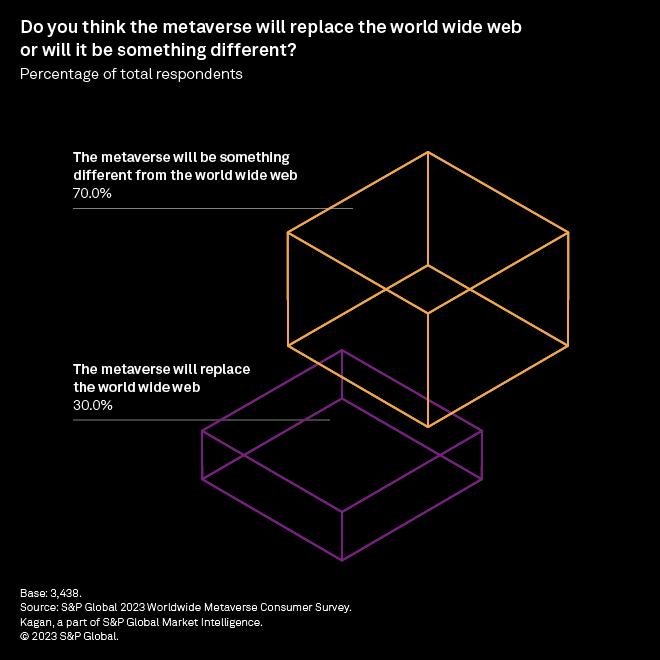
Right now, metaverse-style experiences are virtual worlds accessed through the internet much in the same way that multiplayer video games run on top of existing networking portals and protocols.
While these virtual settings give users the opportunity to engage with people and data in ways that would be difficult or impossible on a flat webpage, they are not efficient platforms to complete computing tasks such as data entry, text messaging and document organization.
In other words, you would struggle to file your taxes, compose a document or pay a utility bill in the metaverse.
Developers may solve these issues over time, but the average consumer can be forgiven for lacking the imagination to see a path forward. Instead, a majority of respondents to our survey likely see the potential metaverse as running parallel with the internet or perhaps as a 3D layer that can be toggled on when appropriate.
Looking at respondent groups by age, we see that millennials were the most likely to be convinced that the metaverse could replace the web. Still, only 35.6% see it as a replacement, meaning a majority of the cohort still believes that the metaverse will be something else. The split for Gen Z was comparable, but older respondents are markedly less convinced in the metaverse as a web replacement.
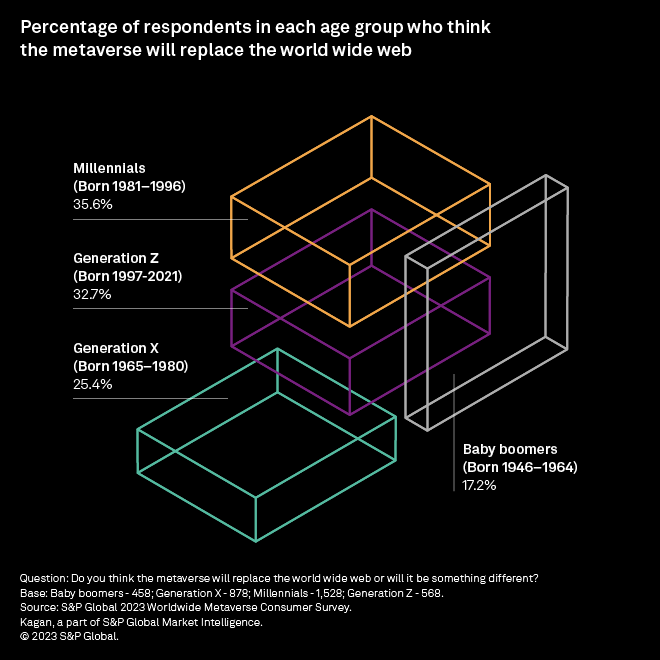
This generational breakdown is true throughout much of our survey, in which millennials and Gen Z respondents generally lead in terms of metaverse literacy and engagement. As we transition to older generations, however, we see levels of understanding and use taper off.
But past the semantics of where the metaverse fits in relation to the web, the majority of respondents said the metaverse will have an impact on consumers. A third of respondents said it will have a major impact, while 46.4% said it will have a moderate impact.
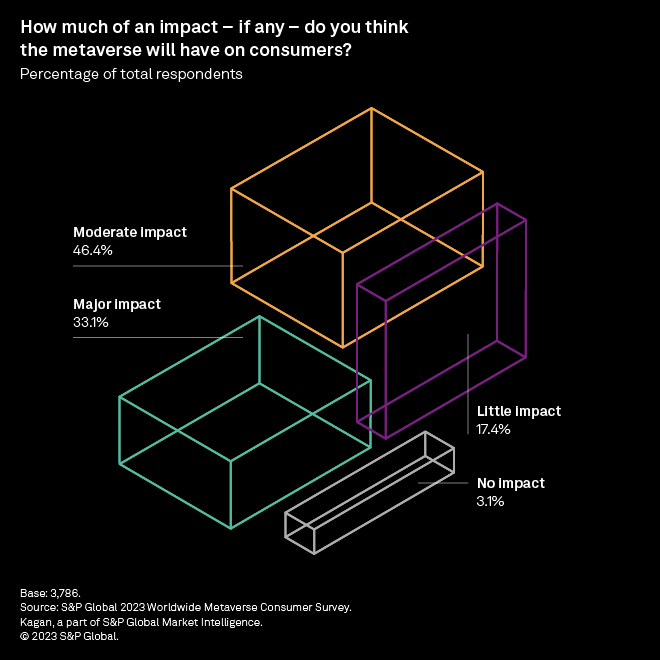
These results suggest that respondents see the potential of virtual worlds to reach further into the lives of average consumers. Perhaps most striking is that only 3.1% of respondents said the metaverse will have "no impact" on consumers.
The survey respondents were also asked for their opinions about when the metaverse, and its associated experiences, will become widely accessed and used by consumers. While 18.3% expected the metaverse to become widely used in the next year, most of the other respondents indicated that a more functional, and compelling, consumer metaverse experience will take some time to develop.
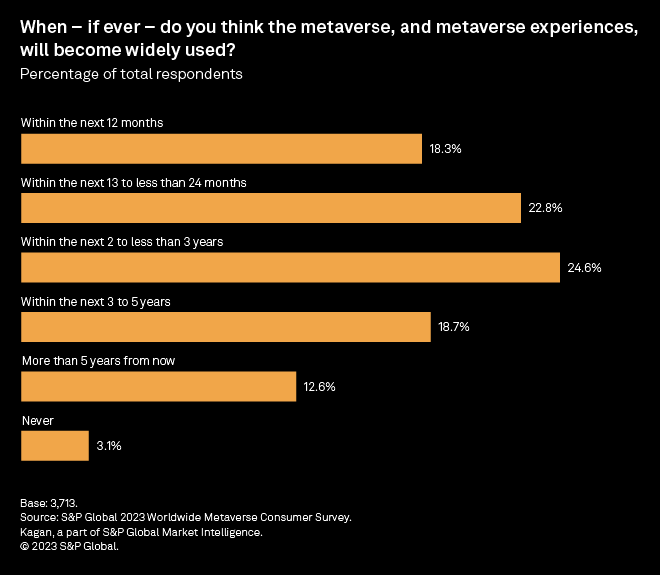
➤ Almost 50% of the respondents stated that it will take another 13 to 35 months before broader usage of the consumer metaverse occurs.
➤ Another 18.7% believe that it will take three to five years before the metaverse will become widely used.
➤ Notably, 12.6% stated that it will take over five years before the metaverse becomes mature and is widely used.
➤ Finally, just over 3% of the survey respondents do not believe that the consumer metaverse will ever become widely used.
Keeping in mind that most of the survey respondents are familiar with the concept of the metaverse and have already spent time in one or more virtual environments, the overall belief that the existence of a more full-featured metaverse is some years away feels both logical and realistic. Many existing virtual environments continue to have an "under construction" feel to them, while some other soon-to-be-available consumer metaverse experiences have seen their introduction dates delayed.
It is also worth noting that there are some geographical differences of opinion about how soon the metaverse will become widely used. For example, there is more belief among North American consumers that the metaverse will become widely used in the next two years than in either the Europe, Middle East and Africa or Asia-Pacific regions.
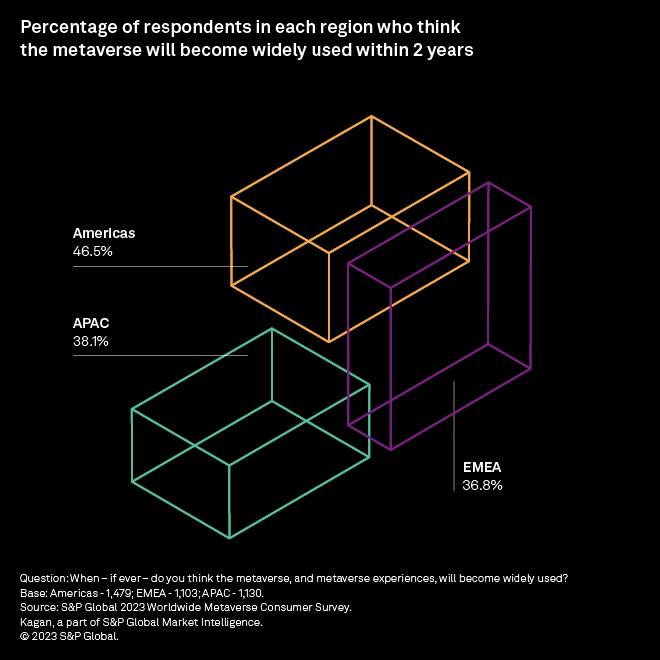
The difference in opinion is not too broad, with 46.5% of North American respondents believing that the metaverse will be widely used within two years, as opposed to 38.1% in Asia-Pacific and 36.8% in EMEA. We believe that this regional difference is due to an increased number of high-profile North American companies playing up the potential importance of the metaverse, in comparison to more cautious enthusiasm emanating from companies in other geographic regions.
Technology is a regular feature from Kagan, a part of S&P Global Market Intelligence.
This article was published by S&P Global Market Intelligence and not by S&P Global Ratings, which is a separately managed division of S&P Global.